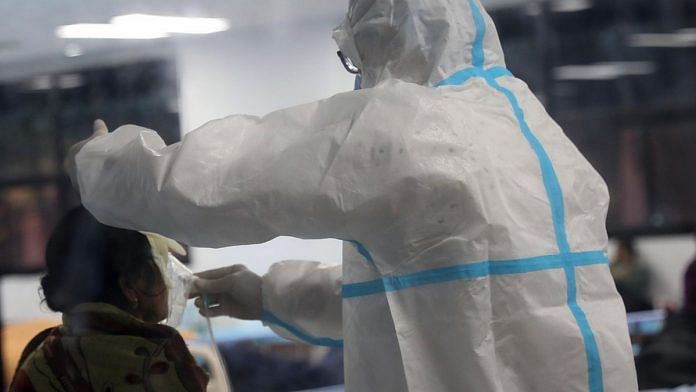
New Delhi: The Arvind Kejriwal-led Delhi government did not take timely preventive measures to contain Covid-19 infections, despite being aware that “confluence of winter, festival season and pollution were likely to witness a surge in cases”, the central government has told the Supreme Court.
In an affidavit filed Thursday, the joint secretary of the Union home ministry said while Delhi government issued regular advertisements about its achievements in healthcare, including on dengue prevention and control, bulletins on Covid appropriate behaviour were not to be seen.
“It is submitted that the Covid situation in the country is being monitored by the Office of the Prime Minister of the country,” stated the affidavit.
The Centre’s response came in a suo motu case initiated by the Supreme Court on treatment of Covid-19 patients and handling of victims’ bodies in Delhi. A bench led by Justice Ashok Bhushan had, in June, referred to several news reports on the lack of infrastructure and a pile-up of bodies at a Delhi hospital.
The bench had then issued a slew of guidelines on measures to be taken to improve medical infrastructure, including capping of prices on Covid-19 tests.
The Centre’s affidavit Thursday claimed that the Delhi government did not take steps to enhance testing capacity — particularly the RT-PCR test — and only 20,000 or so were conducted every day for a long time.
The affidavit also said that recommendations of a high-power committee headed by Dr V.K. Paul (member, Niti Aayog) to increase ICU beds from 3,500 to 6,500 were also not followed. This committee, said the affidavit, had predicted a surge of 15,000 cases every day and had advised preparation of ICU beds accordingly. But no timely measures were carried out by the Delhi government, claimed the Centre.
Also read: 14% of symptomatic people traced in Delhi door-to-door survey not tested for Covid
No house-to-house surveillance, patients not traced properly
Delhi government’s failure to implement preventive measures, as advised by the Centre, had triggered a series of review meetings called by the home ministry between 8 July and 13 November, the affidavit noted.
The Centre said that the sudden pressure on the health infrastructure in Delhi was because its government did not take measures to increase ICU beds.
“The containment measures, as prescribed by the Ministry of Health and Family Welfare, including house-to-house surveillance, contact tracing, quarantine and clinical management, were also not done properly, which has led to the spread of infection,” the affidavit stated.
Patients under home isolation and their contacts were also not traced properly, it added.
Private hospitals didn’t follow clinical management protocol
In a letter to the home ministry last week, the affidavit said, the Delhi government had expressed its inability to enhance ICU beds. The AAP government was asked to increase beds by around 2,680 but it was able to create only 912 more beds. The Delhi government had requested the Centre to create the remaining 1,768 ICU beds.
On RT-PCR tests, Delhi had assured the home ministry that it would enhance testing to around 60,000 by November end, according to the affidavit.
The Delhi government had also been instructed to strictly comply with the prescribed protocol in regard to discharge of patients after it was found that private hospitals were not conforming to the norms, the affidavit added.
“It is also extremely crucial to note here that in a survey of the 114 private hospitals in Delhi, which was carried out by the MHA from 17 November to 18 November, it was found that the observance of discharge policy and prescribed clinical management protocol was very lax, thus leading to a large number of patients not being given proper treatment,” it read.
Central govt to re-activate rail coaches
In the last review meeting held between the Delhi government and the Centre on 15 November, the Ministry of Home Affairs had issued a slew of directions — to increase ICU beds at hospitals, increase beds at the Chhatarpur Covid Care Centre and notify a team, comprising doctors from AIIMS and officials from the health ministry, to visit private hospitals.
The home ministry, according to the affidavit, had also convened a meeting with the Ministry of Railways to re-activate 800 rail coaches as Covid Care Centres. A team of doctors had visited the Shakharpur Basti railway station on 19 November to review the facility.
In the review meeting, the Delhi chief secretary was also told to review home care arrangements and increase capacity of beds for at least 35,000 to 40,000 patients across city.
The AIIMS, Delhi was also asked to explore if retired nurses, doctors and technicians could be employed. The institute was further asked if stable patients could be discharged early and if cases can be managed or followed up via phone calls.
Also read: Delhi reports only 205 ICU beds with ventilators available amid Covid surge

COMMENTS